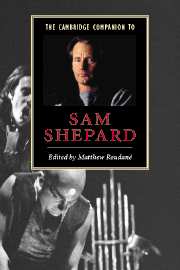Book contents
- Frontmatter
- Introduction
- 1 Born injured
- 2 Shepard and Off-Off-Broadway
- 3 Shepard on Shepard
- 4 A note on Sam Shepard
- 5 Joseph Chaikin and Sam Shepard in collaboration
- 6 Repetition and regression in Curse of the Starving Class and Buried Child
- 7 Shepard writes about writing
- 8 Reflections of the past in True West and A Lie of the Mind
- 9 Patriarchal pathology from The Holy Ghostly to Silent Tongue
- 10 The classic Western and Sam Shepard’s family sagas
- 11 European textures
- 12 Sam Shepard and the cinema
- 13 Sam Shepard as musical experimenter
- 14 Sam Shepard’s nondramatic works
- 15 States of Shock, Simpatico, and Eyes for Consuela
- 16 Sam Shepard’s The Late Henry Moss
- 17 Sam Shepard
- Select bibliography
- Index
10 - The classic Western and Sam Shepard’s family sagas
Published online by Cambridge University Press: 28 May 2006
- Frontmatter
- Introduction
- 1 Born injured
- 2 Shepard and Off-Off-Broadway
- 3 Shepard on Shepard
- 4 A note on Sam Shepard
- 5 Joseph Chaikin and Sam Shepard in collaboration
- 6 Repetition and regression in Curse of the Starving Class and Buried Child
- 7 Shepard writes about writing
- 8 Reflections of the past in True West and A Lie of the Mind
- 9 Patriarchal pathology from The Holy Ghostly to Silent Tongue
- 10 The classic Western and Sam Shepard’s family sagas
- 11 European textures
- 12 Sam Shepard and the cinema
- 13 Sam Shepard as musical experimenter
- 14 Sam Shepard’s nondramatic works
- 15 States of Shock, Simpatico, and Eyes for Consuela
- 16 Sam Shepard’s The Late Henry Moss
- 17 Sam Shepard
- Select bibliography
- Index
Summary
I keep praying for a double bill of Bad Day at Black Rock and Vera Cruz
Motel Chronicles“Cowboy my eyeball. He’s a useless twerp. We shoulda canned him right from the start.”
The Mad Dog BluesAt the beginning of Vera Cruz, Gary Cooper appears riding slowly from the distance, a speck against the vast Mexican desert landscape. When Wim Wenders's film from Sam Shepard's screenplay of Paris, Texas begins, we see Harry Dean Stanton dressed in an old business suit with a baseball cap on his head trudging aimlessly through the eerily white Mojave Desert. The landscape looks as if it is covered in post-apocalyptic ash. Much of the resonance of this moment of anomie comes from the echo of the classic opening of the Western - the lone hero riding out of the wilderness for a brief foray into society to perform a saving act. Shepard's Travis will also perform such an act but, like the world in which it takes place, now more a spiritual than physical wilderness, the act will be morally ambiguous.
While much has been written about the Western hero and Shepard’s own persona as actor and public figure and about the role of the cowboy in his early works, I want to focus here on echoes of the classic Westerns Shepard grew up with in the family sagas he wrote in the 1970s and 1980s. It is in the echoes of the Western hero in Shepard’s work that we see most vividly what the contemporary American male has lost, a loss connected again and again to the terrifying or ineffectual patriarchal wanderer always associated with the desert.
- Type
- Chapter
- Information
- The Cambridge Companion to Sam Shepard , pp. 171 - 188Publisher: Cambridge University PressPrint publication year: 2002
- 1
- Cited by



